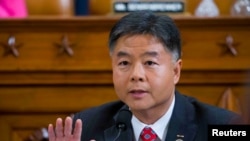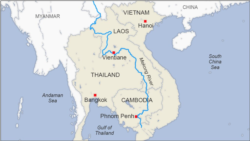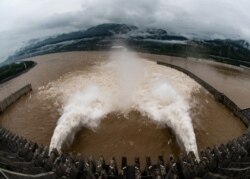Southeast Asia can expect greater attention from the U.S. Congress and the White House, a House Foreign Affairs Committee member said recently, as the committee and government plan to increase cooperation with the region on issues such as climate change and Mekong River management.
Rep. Ted Lieu, a Democrat from California, told a virtual panel hosted by the East-West Center in late February that the Democrat-controlled Foreign Affairs Committee will have more time in 2021 to focus on Southeast Asia and that he would personally push for more attention for the Mekong region.
As a member of the House Subcommittee on Asia, the Pacific, Central Asia, and Nonproliferation, Lieu said he would “raise the profile of the Mekong region, which as all of you know, the Foreign Affairs Committee hasn’t really focused on and I think it’s time that we do.”
Lieu also serves on the House Judiciary Committee. He has been a House of Representative member since 2014 and is the Congressional Asian Pacific American Caucus whip.
Lieu said President Biden plans to increase cooperation with the ASEAN regional bloc and that the Biden administration is likely to welcome the House Foreign Affairs Committee’s recommendations on engaging the region.
“Now… we have a president that will work with our allies, work with ASEAN countries and that is much more focused on collaboration, and that… views climate change as a huge threat,” Lieu told the panel, which included the ambassadors to the U.S. from Thailand, Vietnam and Cambodia, as well as a senior State Department official.
“The climate change question is going to filter through to all our foreign policy questions, and that is a huge issue, as all of you know, for the Mekong region.”
Lieu said, “This increased collaboration [between the U.S. and the Mekong countries] is also necessary to prevent any overreach from China. We need to make sure that the [natural] resources are equitably distributed and that our [Mekong] partners are not unfairly discriminated against.”
The panel came together to discuss the threats to the Mekong River basin that were highlighted in a new report by the Congress-funded East-West Center.
The report emphasized the need for improved transboundary management of the Mekong -- which flows through China, Myanmar, Laos, Thailand, Vietnam and Cambodia -- in order to address challenges posed by climate change, shifting hydrological conditions, chronic droughts, and natural disasters.
Mekong region countries are grappling with these challenges and some downstream countries have voiced strong concerns over large hydropower dams upstream in China and Laos that appear to be impacting the river’s flood pulse.
These challenges and concerns have become urgent in recent years, as the river has experienced unusually low water levels that affected its extraordinary natural productivity. Tens of millions of people in the region survive on the river’s bounty by relying on fishing and agriculture.
The U.S. has strongly backed the concerns that China’s lack of cooperation and transparency over its use of the Mekong is having negative impacts downstream, and the issue that appears to have become part of the U.S.-China rivalry in Southeast Asia.
The U.S. government had a cooperation program with the Mekong region countries since 2009 and recently launched a new $150-million program to address challenges to the river basin, support energy markets, and combat transnational crime.
China has become increasingly dominant diplomatically and economically in the Mekong region, which it neighbors, and has been particularly influential in Laos, Cambodia and Myanmar.






